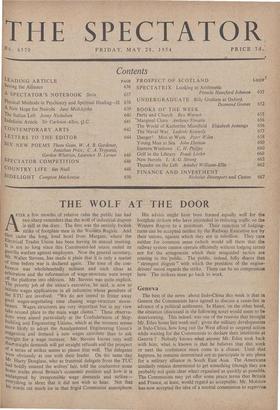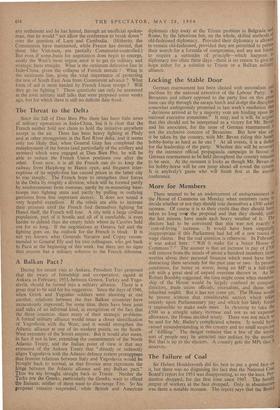Geneva The best of the news about lndo-China this week
is that in Geneva the Communists have agreed to discuss a cease-fire in advance of a political settlement. In Hanoi, on the other hand, the situation (discussed in the following note) would seem to be deteriorating. This indeed, was one of the reasons that brought Mr. Eden home last week-end: given the military developments in Indo-China, how long can the West afford to suspend action while waiting for the Communists to declare their intentions at Geneva? Nobody knows what answer Mr. Eden took back with him; what is known is that he believes that this week or next the conference must come to a climax. Until that happens, he remains determined not to participate in any plans for a military alliance in South East Asia. The Americans similarly remain determined to get something (though they are probably not quite clear what) organised as quickly as possible. The Communists may yet offer some peace terms that Britain and France, at least, would regard as acceptable; Mr. Molotov has now accepted the idea of a neutral commission to supervise any settlement and he has hinted, through an unofficial spokes- man, that he would "not allow the conference to break down" over the question of Laos and Cambodia. (Hitherto, the Communists have maintained, while France has denied, that these, like Viet-nam, are partially Communist-controlled.) But even if some basis for negotiation does begin to emerge, surely the West's most urgent need is to get its military and strategic facts straight. What is the optimum defensive line in Indo-China, given the collapse of French morale ? What is the minimum line, given the vital importance of protecting the rest of South East Asia from Communist advance ? What form of aid is most needed by French Union troops ? Will they go on fighting ? These questions can only be answered at the joint military staff talks that were proposed some weeks ago, but for which there is still no definite date fixed.



































































 Previous page
Previous page